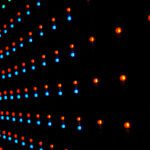Curtin University researchers have been awarded $3.29 million in Federal Government Australian Research Council (ARC) Future Fellowships to support research projects, ranging in focus from brain function during ageing to deep exploration of the galaxy.
Prestigious ARC Future Fellowships were granted to four Curtin University researchers– Dr Mark Hackett from Curtin’s School of Molecular and Life Sciences, Dr Natasha Hurley-Walker from Curtin’s Institute of Radio Astronomy, Dr Jun Li from Curtin’s School of Civil and Mechanical Engineering and Dr Simone Ciampi from Curtin’s School of Molecular and Life Sciences.
Curtin University Vice-Chancellor Professor Deborah Terry congratulated the University’s ARC grant recipients, who are all outstanding mid-career academics.
“These four remarkable recipients represent the future of research in Australia and these grants confirm they have an exciting future ahead” Professor Terry said.
“The ARC Future Fellowships are only granted to the nation’s brightest and best researchers to continue their world-class work right here in Australia, and Dr Hackett, Dr Hurley-Walker, Dr Li and Dr Ciampi are all leaders in their respective fields,” Professor Terry said.
“The Fellowships aim to attract and retain Australia’s top mid-career researchers, and each of these four outstanding awardees will play a vital part in helping boost the country’s research and innovation capacity.
“Their achievement reflects the excellent ongoing work of Curtin researchers in the field of Science and Engineering.”
The ARC Future Fellowships support research in areas of critical national importance by giving outstanding mid-career researchers incentives to conduct their research in Australia.
The successful Curtin University researchers are:
- Dr Mark Hackett (School of Molecular and Life Sciences): Delivering new tools to visualise how changes to blood vessels during ageing affect the amount and distribution of metal ions in brain cells ($739,302)
- Dr Simone Ciampi (School of Molecular and Life Sciences): Creating new methods to convert friction into continuous sources of electricity to benefit the design and function of silicon-based devices such as pacemakers ($880,383)
- Dr Natasha Hurley-Walker (Curtin Institute of Radio Astronomy): Exploring the entire radio sky visible to the future Square Kilometre Array ten times more deeply than before. The resulting survey will have broad application including the study of galaxy clusters and cosmic ray tomography of the Milky Way ($857,533)
- Dr Jun Li (School of Civil and Mechanical Engineering): Developing technologies, including cutting edge AI techniques, for innovative data collection, analysis and prediction to efficiently monitor engineering assets and to detect possible structural degradation and potential failure ($821,000)



